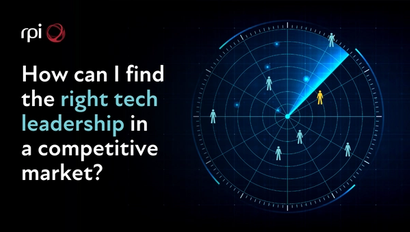When Stuart Wilson founded RPI with Julian Frankum in 1998, it was at the start of the mobile communications boom. For over two decades, Stuart has been at the heart of an evolving Telco industry, sourcing the talent that Telcos needed to support their rapid growth.
Yet with mobile and digital increasingly leading competitive advantage in everything from finance to aviation, it’s not just Telco companies who have benefitted from the skills developed by the industry over the past 20 years, with Telco technology and talent both driving transformation across a multitude of sectors.
Here, Stuart tells us about the evolution of the Telco sector, how it has shaped the global talent market and its influence on our emerging connected society.
RPI’s heritage in telecoms has placed you at the centre of technological change over the last 23 years. Talk us through that journey and how you’ve seen the telco landscape change in that time.
When we started, the world was a different place. A relatively small percentage of people had mobile phones, but mobile was seen as the future. The big players – Vodafone, Orange, Telefonica, and so on – were setting up new licences, going on massive expansion plans around the world and paying hundreds of millions of dollars to buy ‘spectrum’ for mobile. They were essentially buying air. It was a great earner for governments because they were earning an enormous amount of money selling something they didn't know they owned in the first place. It was an interesting time – but as soon as those Telcos wrote that big fat check to the government, they needed to bring some revenue in as quickly as possible, which meant building their business fast.
That’s how we [RPI] became involved. We would help them put together their localisation packages and deploy hit-teams of highly experienced interim executives, who would launch teams to get the business up and running as quickly as possible.
Once the licence was awarded and the business was up and running, we would conduct an extensive executive search to find the people who were going to fill those roles on a permanent basis. So the two sides of the company [permanent and interim] worked very, very closely together. It often meant that we would spend significant amounts of on time on site. I lived in Cairo for three months, Hungary, Algeria, Rome… actually living and breathing these companies as they grew up.
Twenty-three years later and the telco industry has completely flipped on its head. There’s more money now in fixed broadband satellites. Companies aren’t making money from voice calls; in fact, even data calls aren’t generating revenue. In the last five years, your mobile phone bill has probably done nothing but decrease. Then there’s the evolution of 5G and the costs involved in establishing that network.
If Telcos are going to carry on boosting their profits, they need to cut costs, and one way to do this is by investing in technology. Yet many of these companies have significant legacy infrastructure, often having formed as the result of several smaller companies coming together, each with their own IT systems. As a result, technology transformation – bringing together disparate systems into a more cohesive system – has been a focal point for Telco businesses in recent years, as it has for many industries all over the world. And RPI were, again, there to help them make that transformation.
You mentioned sourcing highly experienced executives to launch teams. How has being part of that process allowed you to see the skills that are driving transformation across other sectors?
I think what we're seeing is a move away from pure ‘tech’ skillsets into hires that are more business savvy. The key skills that are in demand at the moment are, of course, an understanding of advanced technology, but it's really people that have a commercial view as well as a technical view, and know how to get the most out of technology. I think in the old days, it used to be more about getting the job done – but the world wasn't changing as fast as it is now.
What we've also seen is the need for a change in mindset. There’s a number of my clients at the moment where the top and bottom of the pyramid sees and understands the need to change, but there's a massive swathe of middle management who are resistant to it. I think one problem with the telco industry, as a rapid growth industry, is that there are some people within it who have got to where they are without necessarily being the best person: they’ve just been carried along by the wave.
For a lot of our assignments, we are called in to find a balanced shortlist of people with telco experience and people with non-telco experience. They often need somebody who's smart and can understand more of the complex issues than, perhaps, somebody who's come from a pure Telco background. A few years ago, Telcos were only looking for people who were dyed-in-the-wool telco. Nowadays, they are much more open to a diverse talent pool… and that applies to a lot of sectors, I think, not just Telco.
How can the skills that have been developed and nurtured by Telcos in recent years now benefit other sectors?
Well, the thing is, telcos are evolving. The whole telco world has become about communication, about business enablement. They’ve moved into IoT, which is moving into connected vehicles, connected cars, smart cities, e-health. Then you look at things like mobile gaming, cloud-based gambling, AR, VR. Then, there’s 5G and the impact that ultra-low latency will have on automation: it's going to change the world.
That connected future is all based around Telco infrastructure. Without it, none of this emerging society would be possible. All of those skills and technologies that are being developed in telco, are going to benefit almost every sector.
5G has been a big financial demand on the Telco industry. How important is the next few years of rollout to 5G to Telcos commercially?
Well, they've spent a lot of money on 5G licences. In some countries, they've paid a crazy amount, with some ridiculous auction programmes. There was one recently in Portugal where they had almost 2000 rounds of bidding for the 5G spectrum. There were some who chose not to bid, because they thought it was just crazy amounts of money, and I think that’s interesting. There’s a lot of talk about 5G, but there's also a lot of people worldwide who are going to survive without it for many, many years to come. It's not going to be everybody's cup of tea from day one, and it's not an essential thing that everybody needs.
I think it'll be very interesting to see who the commercial winners and losers of 5G are, because a lot of money has been spent. Are they really going to be able to monetise it enough? I think those who have been more cautious may find themselves at an advantage, having saved that colossal spend. It comes back again to this focus on commercial, not just tech, skills.
How has the pandemic – and increased hybrid/WFH culture – changed access to global talent, and the way businesses approach talent acquisition?
The whole world has changed, and I don’t think it will ever return to where it was. Although, I have spent several days on site with clients recently, and it did bring back to me that there is no substitute for a face-to-face meeting. If I was betting overall, I think a lot of people will probably have a more flexible hybrid model.
What we have seen is that clients are far more open to their hires working from home. People will not need to spend as much time ‘in the office’, especially when they're working on international assignments: it means less money on expenses and travel, but also less travel equals less impact on the environment.
However, I think one issue is that the people most capable and willing to work from home are the more senior and experienced. What does this mean for the younger people who want or need to be in the office? How are we making sure they can access the knowledge and experience they need to grow in their careers? That communication of skills is really important. We have to make sure it doesn’t get lost.
Did any of your clients make hiring choices based on work from home, long-distance arrangements, that they may not have made before the pandemic?
I’ve definitely seen people that wouldn't have taken jobs that far away. If you've only got to go to the office twice a week, then you may consider a wider location and a longer commute than you would if you were expected to do it every day. And that’s given businesses more opportunities to reach the right people for the role.
However, the demand for talent has gone ballistic over the last few months, and every candidate who is actively looking has a choice of offers and is receiving competitive counteroffers on salary. It's very much a candidate’s market at the moment.
How does that affect things for you and your clients?
We have to qualify people better and be very careful about managing the process. Before COVID, if somebody was out of work, and they received a job offer, they would definitely take that job offer. Nowadays, if people are actively looking for a job, they are getting two or three, even four, offers.
As a result, we're seeing more of a move to exclusive retained search: essentially head hunting for the right roles. The client makes a commitment to us, and we make a commitment to them to deliver. If you're just speaking to candidates that are out in the job market, then they're going to be talking to 100 people, so the chances of actually securing them is very slim. If you're going out head hunting, identifying talent that is only speaking to you and your client about a specific opportunity, then the chance of filling it is much higher.
Businesses in every sector are tapping into global talent flows to access the skills they need, when they need them. To discuss how RPI’s extensive global network can help you secure the right candidate for your next hire, contact Stuart Wilson | LinkedIn sw@rpint.com



